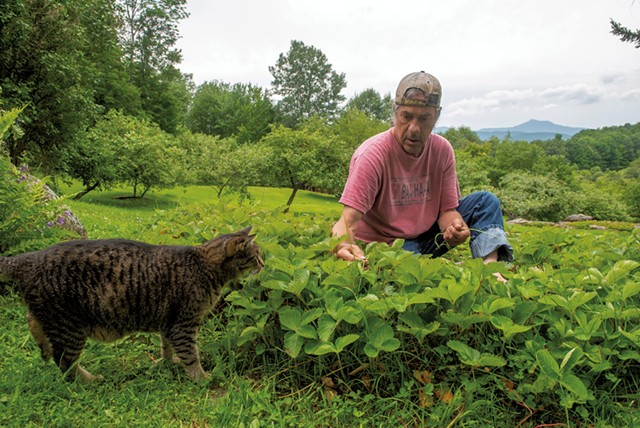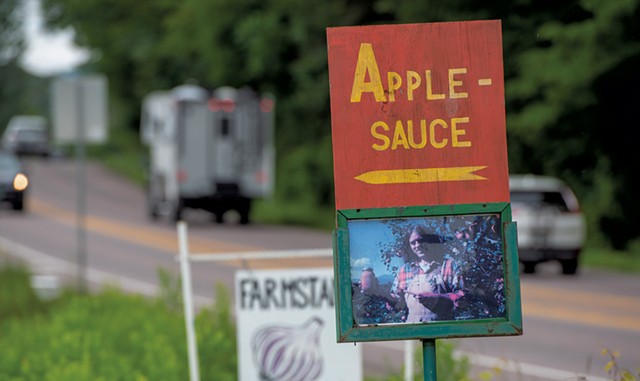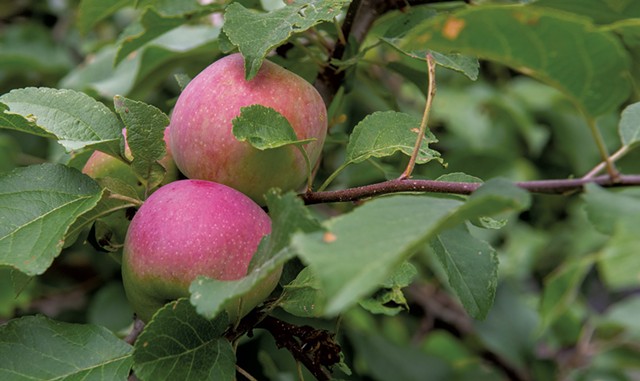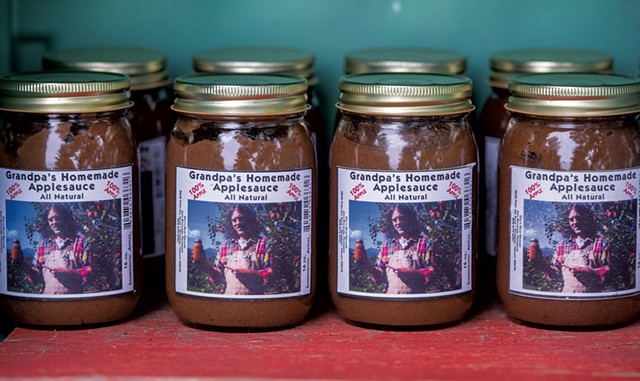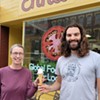Switch to the mobile version of this page.
Vermont's Independent Voice
- News
- Arts+Culture
- Home+Design
- Food
- Cannabis
- Music
- On Screen
- Events
- Jobs
- Obituaries
- Classifieds
- Personals
Browse News
Departments
-
News

Middlebury College President Patton to Step Down…
-
News

Overdose-Prevention Site Bill Advances in the Vermont…
-
Housing Crisis

'We're Leaving': Winooski's Bargain Real Estate Attracted…
- Aggressive Behavior, Increased Drug Use at Burlington's Downtown Library Prompt Calls for Help City 0
- An Act 250 Bill Would Fast-Track Approval of Downtown Housing While Protecting Natural Areas Environment 0
- Through Arts Such as Weaving, Older Vermonters Reflect on Their Lives and Losses This Old State 0
Browse Arts + Culture
View All
local resources
Browse Food + Drink
View All
Browse Cannabis
View All
-
Culture

'Cannasations' Podcaster Kris Brown Aims to 'Humanize'…
-
True 802

A Burlington Cannabis Shop Plans to Host…
-
Business

Judge Tosses Burlington Cannabiz Owner's Lawsuit
-
Health + Fitness

Vermont's Cannabis Nurse Hotline Answers Health Questions…
-
Business

Waterbury Couple Buy Rare Vermont Cannabis License
Browse Music
View All
Browse On Screen
Browse Events
Browse Classifieds
Browse Personals
-

If you're looking for "I Spys," dating or LTRs, this is your scene.
View Profiles
Special Reports
Pubs+More
At Owl’s Head Orchard in Waterbury, CSA Members Pick Unsprayed Fruit
Published August 3, 2021 at 2:29 p.m. | Updated August 4, 2021 at 10:02 a.m.
"The orchard is a mistake," Jody Bouchard proclaimed, sitting among his 300 semidwarf apple trees on a Waterbury hillside with a stunning view of Camel's Hump.
The mistake, he explained, dates back 28 years to an unexpected tax refund. Bouchard's then brother-in-law had mentioned wanting an orchard to keep his five sons busy. With some of the windfall, Bouchard, now 69, decided to surprise him with one.
"I bought 60 bare-root trees and start walking them down there," Bouchard recalled. "He says, 'I only want 12.' And I'm thinking, What the frickin' hell am I gonna do with 48 damn apple trees?"
As mistakes go, this one turned out OK. This fall, for the third year, Bouchard is offering a limited number of community-supported agriculture memberships that allow people to see his "mistake" for themselves. In his orchard, they find something unusual — apples that have never been sprayed.
"From day one, square one," Bouchard has not used a single drop of chemical pesticide, fungicide or herbicide — even organic ones. "We're eating too many chemicals," he said.
Owl's Head Orchard boasts a majestic stone stairway, edged with strawberry plants, that cascades down from the rustic home Bouchard built himself in 1978. Scattered around the property are 200 varieties of apple trees, plus plums, pears, peaches, berry bushes and grape vines. On a recent Friday morning, the soft crooning of mourning doves mingled with the sonorous booms of frogs in the pond at the foot of the hill.
The spot ranks high among scenic Vermont orchards. But, after a short-lived pick-your-own experiment in the early 2000s, Owl's Head has been mostly closed to public picking.
"They didn't twirl and pull the apples," Bouchard said sadly, referring to the proper picking technique that every young Vermonter learns on fall field trips. "They damaged the trees. We had to shut it down."
For the next 15 years, Bouchard and his three grandchildren — now 16, 19 and 21 — focused on milling apples into applesauce to sell and pressing fresh cider to give away.
If you've driven to Stowe from Interstate 89, you may have noticed a handmade sign for Grandpa's Homemade Applesauce where Guptil Road intersects Route 100. From there, three more signs guide you just over two and a half miles to gray-ponytailed Grandpa Bouchard himself, who's most likely to be padding around barefoot, tending to his beloved trees and berry bushes.
"You're not supposed to be wearing shoes," he admonished this reporter. "You're an electrical-chemical reaction, and you're supposed to ground out to this planet." She promptly took off her shoes.
In 2019, Bouchard ventured back into a more controlled version of pick-your-own, offering CSA memberships. Last year, he had 14 members, but he's hoping for at least double that this year. The season-long relationship allows him to educate the public on how to harvest without hurting "his babies," as he calls his trees.
For $120 up-front, members can pick four bushels of apples over the season. That's about 180 pounds — for less than $3.50 per standard supermarket five-pound bag — but Bouchard is not counting closely. As long as people don't fill a pickup truck, "I don't give a rat's ass how many apples you pick if you can use them," he said with characteristic frankness. "That's all I'm interested in. Don't be wasteful."
Although some Vermont orchards produce unsprayed cider fruit, it's rare to see fruit sold for eating whole grown that way. When people eat his fruit, Bouchard asserted, "they say they can taste the difference."
Bouchard's approach is "pretty unique," confirmed Terence Bradshaw, an assistant professor and apple specialist at the University of Vermont. He noted three possible factors that make it work. First, the orchard's location, far from big commercial orchards, helps reduce exposure to pests such as apple maggots. Second, making sauce gives Bouchard "room to wiggle" because cosmetic and other small imperfections don't show in the final product. Finally, Bradshaw pointed out, Bouchard has never made a living from his orchard.
When he established his orchard, in the 1990s, Bouchard was working at IBM's technology development lab in Essex Junction. He initially landed a job at the facility's machine shop, thanks to an ability to build things, he said: "I grew up in my grandfather's machine and model shop."
The Stowe native's appreciation for nature and the outdoors also runs deep. He started skiing at age 3 and a half. "Holy crap, we lived on the mountain!" he exclaimed.
At 21, Bouchard decided to head out and see the world. "I got as far as Waterbury and said, 'Damn, this is nice. I gotta get me a piece of it,'" he said.
The young man ended up riding a motorcycle from Vermont to Miami, but he saw no reason to settle anywhere but the Green Mountain State. "I like my four seasons. A lot," he said.
In 1976, Bouchard bought his hillside 10-acre lot for $10,000. The old farmstead had no power lines, septic system or buildings. At the time, Waterbury was known mostly for the Vermont State Hospital, previously called the Vermont State Asylum for the Insane. "People would lock their [car] doors and not open them 'til they got to the other side of town," he said.
But Bouchard didn't care about the town's reputation, just as he didn't care when people said it wasn't possible to grow apples without chemicals.
His day job not only supported his orchard but also informed his approach to it. "At IBM, they'd want us to do things that were impossible. Rather than get hung up on what was impossible, we'd say, 'Let's find a way to make it happen,'" he said. "This was just a great experiment. A standard orchard couldn't afford to do that."
To control pests, Bouchard focused on increasing the population of natural predators. His three grandkids spent a lot of time with their grandfather. "I challenged the kids to come up with a strategy," he said.
They found that frogs and dragonflies were the most voracious pest eaters and collected five-gallon buckets of tree frog eggs and dragonfly larvae from nearby beaver ponds to put in the orchard pond. "It makes our numbers stupid [good]," Bouchard said proudly.
Grandpa's applesauce was really grandkids' applesauce. The product was a multiyear, hands-on lesson in entrepreneurship and life skills. Bouchard believes strongly that it's never too early to teach youngsters how the world works and that rewards must be earned. But, he asked rhetorically, "Who the hell's going to hire a 6-year-old to do jack shit?"
The value of the lesson went far beyond the ski passes the kids bought with the proceeds. "The applesauce business wasn't to make money but to learn how to make and run a business," Bouchard said.
For one year, the family sold bulk applesauce to Central Vermont Medical Center. But when the hospital asked for one-cup plastic containers, "the kids decided they didn't want to be part of the plastic island in the Pacific," he said, and the arrangement ended.
Bouchard's grandkids helped formulate the apple blend for the sauce: 75 percent what he calls the "muscle apple" and 25 percent "spice apples." The latter deliver "that little bit of bite in the ass," Bouchard said.
These days, the grandkids are off doing other things, and most of the sauce production is back to Grandpa. Bouchard sells about 2,000 to 2,500 pints annually at $5 apiece from a self-serve stand at the top of his driveway.
While applesauce is a way to use imperfect fruit, Bouchard said, each year yields plenty of perfect apples among the many varieties dotting the hillside. Familiar classics such as McIntosh, Empire and Northern Spy mingle with "a crapload of antique varieties," including Wolf River and Yellow Transparent. The orchard has about 20 unnamed apples from the University of Vermont — "all wicked good," according to Bouchard.
One minor issue: Bouchard admitted that he's not sure of the exact location of every variety. "The map for the orchard was in a typewriter case in my jeep," he said. When that car was stolen from a Waterbury parking lot, he lost the map, along with a set of cutting torches and a splitting awl.
But names aren't that important to Bouchard. He encourages CSA members to walk around and taste until "you come across an apple that smokes your shorts." His "favoritest" is the tart-sweet, garnet-hued Liberty.
Abby Fish of Waterbury was a charter member of Owl's Head Orchard's CSA. The home daycare provider has known Bouchard for more than a decade and has long brought small groups to the orchard every fall. "It's the most picturesque and peaceful place to pick," she said. "It's awesome to be able to show the kids that, even though an apple doesn't look perfect, it can still be delicious."
Fish loves the variety and Bouchard's personal touch. "Jody helps me remember which are my favorite for eating and which are going to make really good cider," she said. "Every time I go up there, he shows me or teaches me at least one new thing."
Bouchard hopes that the CSA grows just enough to cover the cost of orchard maintenance. It would be good, he said, "if it could keep me from having to pull from my social security check to buy a new lawnmower."
Looking a little further ahead, Bouchard added, "I'd like to give the orchard to the kids. They grew up here. They know every rock, plant and tree on this hill."
The original print version of this article was headlined "Apple of His Eye | At Owl's Head Orchard, CSA members pick unsprayed fruit"
Got something to say?
Send a letter to the editor
and we'll publish your feedback in print!
Tags: Food + Drink Features, Waterbury, Owl's Head Orchard, apples, orchard, CSA, Grandpa's Homemade Applesauce, applesauce
More By This Author
About The Author

Melissa Pasanen
Bio:
Melissa Pasanen is a food writer for Seven Days. She is an award-winning cookbook author and journalist who has covered food and agriculture in Vermont for 20 years.
Melissa Pasanen is a food writer for Seven Days. She is an award-winning cookbook author and journalist who has covered food and agriculture in Vermont for 20 years.
Speaking of...
-

Three Questions for Cory Swafford of Waterbury’s Blackback Pub
Apr 30, 2024 -

Rep. Anne Donahue Is Determined to Find Out Where Patients of Vermont’s Old Psychiatric Hospital Are Buried
Mar 20, 2024 -

Waterbury: What to See, Do and Eat During the Eclipse
Mar 6, 2024 -

Waterbury’s Craft Beer Cellar Gets a New Name — and a Bar
Feb 27, 2024 -

Q&A: Meet a Family in Waterbury That Embraces Halloween Year-Round
Feb 14, 2024 - More »
Comments
Comments are closed.
From 2014-2020, Seven Days allowed readers to comment on all stories posted on our website. While we've appreciated the suggestions and insights, right now Seven Days is prioritizing our core mission — producing high-quality, responsible local journalism — over moderating online debates between readers.
To criticize, correct or praise our reporting, please send us a letter to the editor or send us a tip. We’ll check it out and report the results.
Online comments may return when we have better tech tools for managing them. Thanks for reading.
- 1. Nunyuns Bakery & Café to Close in Burlington's Old North End Food News
- 2. Burlington’s Blue Cat Steak & Wine Bar Closes After 18 Years Food News
- 3. Reinvented Deep City Brings Penny Cluse Café's Beloved Brunch Back to Burlington First Bite
- 4. In Montpelier, Enna to Serve Gelato; Dairy Creme for Sale Food News
- 5. Three Questions for Cory Swafford of Waterbury’s Blackback Pub Grilling the Chef
- 6. Montréal's Jewish Eateries Serve Classics From Around the World Québec Guide
- 7. La Montañuela and D’Aversa Furniture to Open Wine Bar-Showroom in Vergennes Food News
- 1. Montréal's Jewish Eateries Serve Classics From Around the World Québec Guide
- 2. Pauline's Café Closes in South Burlington After Almost Half a Century Food News
- 3. Reinvented Deep City Brings Penny Cluse Café's Beloved Brunch Back to Burlington First Bite
- 4. Small Pleasures: Monument Farms Dairy’s Chocolate Milk Inspires Devotion Small Pleasures
- 5. Ondis Serves Seasonal Fare With a Side of Community in Montpelier Food + Drink Features
- 6. New Sheep Shop Café on a South Woodbury Homestead Gathers the Herd Food + Drink Features
- 7. Standing Stone Wines Pours Affordable Flights in Winooski Drink Up
























